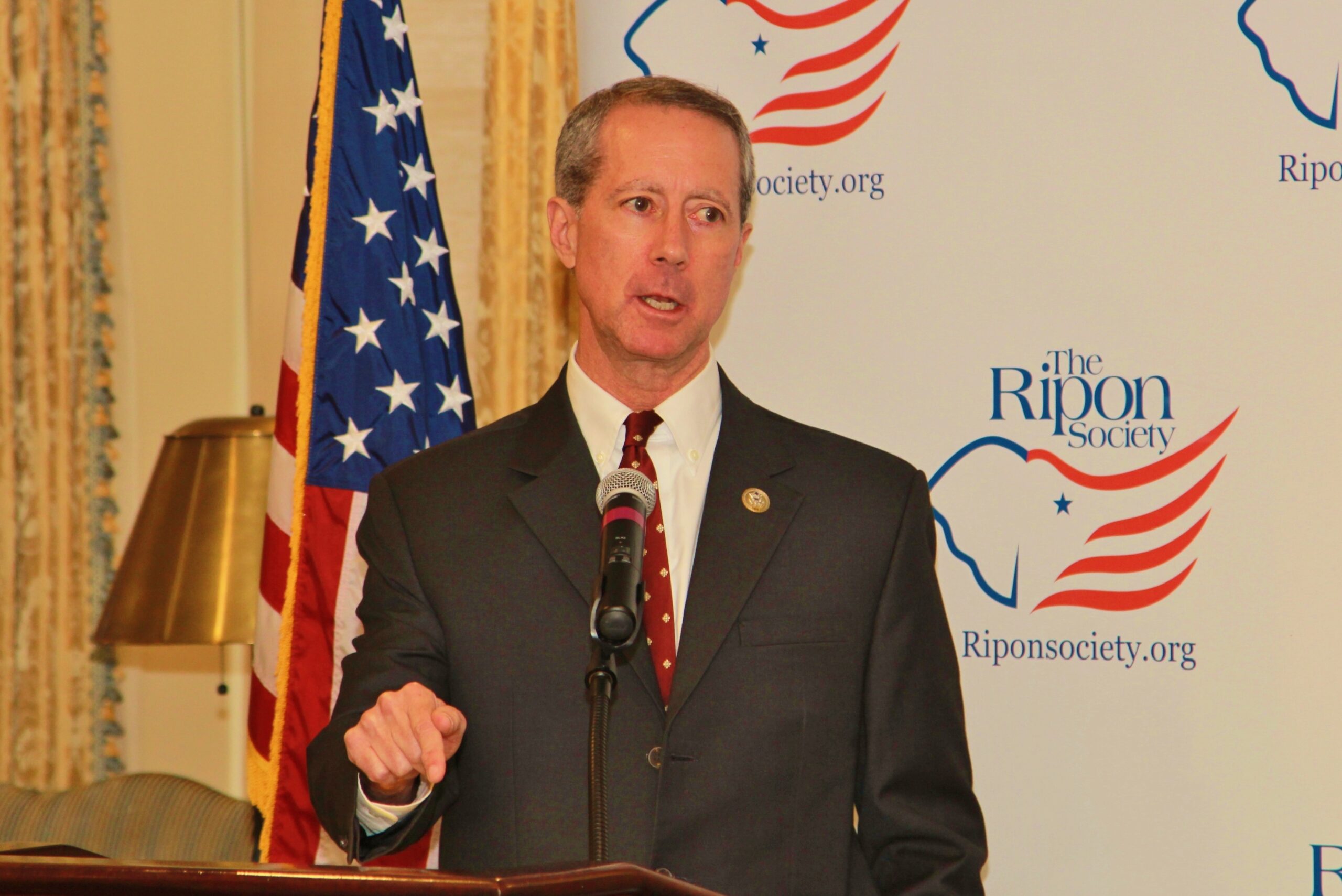 Thornberry Leads Push to Strengthen America’s Military Readiness
Thornberry Leads Push to Strengthen America’s Military Readiness
WASHINGTON, DC – With Congress nearing agreement on a plan to rebuild our military, The Ripon Society held a breakfast discussion yesterday with the plan’s main architect, U.S. Rep. Mac Thornberry of Texas, who spoke not only about why the plan was needed, but the increasing number of threats facing America around the globe.
“If you step back and look at the bigger picture,” Thornberry stated, “I think there are two trends of significance. One trend is that the threats are getting more numerous and more complex. Once upon a time, we had a very big threat called the Soviet Union which could annihilate the United States, so our all-out effort and focus was on it. Now we have a resurgent Russia, which has a lot of the same capabilities, and a rising China.
“In addition to that, we’ve got an insurgent-type state in Iran that is spreading its influence across the Middle East and beyond. Terrorism has not gone away, so you have ISIS and Al-Qaeda. I was in Iraq 10 days ago. Fortunately, the Iraqis and the Syrian democratic forces are shrinking the territory that ISIS controls in Iraq and Syria. But what is also happening is a bunch of them are slipping out to other places. The kind of thing we just saw in New York — lone wolves inspired by their ideology based on videos and so forth — is something that the West will have to continue to deal with.
“And then, in addition to that, you have what most Americans have been focused on recently, and that is the threat of North Korea … I think the feeling that Americans have about being under the threat of missiles that can reach our homeland — from this outlaw regime that is not crazy, but also not rational in the way we are thinking of it — is bringing it home to people in a way that has not happened before.”
Thornberry serves as Chairman of the House Armed Services Committee. First elected as part of the Republican Revolution of 1994, he also serves as Chairman of the House-Senate Conference Committee that is nearing agreement on the 2018 National Defense Authorization Act. Thornberry talked about this agreement in his remarks, noting that one of the main goals of the 2018 NDAA was to rebuild America’s military — which, he said, has been woefully underfunded in recent years.
“We have cut the defense budget about 20% in the last seven years,” the veteran lawmaker declared. “I suspect most people did not know that. I suspect that there is not another major government program that has been cut 20% in the last seven or eight years. But today, we are spending 18% less on defense than was spent in 2010. Now, how can it possibly have happened that we are 20% lower in funding, and yet the threats are going up?
“As Secretary Mattis has testified, the way it has happened is on the backs of the men and women who serve. We are asking them to do more and more, but there is a limit even to what they can do. And you’re seeing some of those limits when you see recent accident rates. For example, we just got the report last week on the two terrible destroyer accidents in the Pacific that killed all those sailors. It turns out that some of those sailors were working 100 hours a week. None of those ships were compliant with all the certifications. They never had time to go into port and do the inspections so they could be certified.”
“The feeling has been that you can’t take one of those destroyers that is important for missile defense offline when you have this threat looming from North Korea. So what you do is ask everyone to just work harder — to work more. But there is a limit even to what they can do. Now we have two fewer destroyers than we had before, because it is going to take months and months and a lot of money to fix those two ships. It’s just an example. But if you look at accident rates across the board, they are going up in a variety of ways.”
According to Thornberry, it is not just the Navy that has been underfunded. Other service branches are facing readiness issues, too. “We heard testimony this year that our Air Force pilots are getting fewer flying hours today than pilots got in the hollowed-out military period of the 1970s,” he noted.
To the extent that the post-Vietnam era is recognized as being one of the lowest points in history when it comes to U.S. military strength and readiness, Thornberry said he thought it would be helpful to look back at that time to see how the readiness crisis was addressed – and overcome – then. “Reagan came in to repair and rebuild the military,” he observed, “so I thought it would be interesting to go back and look at what sort of budget increases it took for him to rebuild the military after the hollowed-out, post-Vietnam Jimmy Carter days.”
What Thornberry found is that Reagan increased defense spending by 17% his first year in office, 18% his second year in office, 13% his third year in office, 9% his fourth year in office, and 11% his fifth year in office. “That’s the sort of thing it took to get out of the hollow military of the ‘70s,” he stated, “and that’s the sort of thing it’s going to take for us if we are going to fix things today. It’s something that will require sustained effort, because we have done deep and lasting damage.”
The Texas Republican added that today’s readiness crisis will not be overcome by simply throwing money at the problem. “We need to spend it more efficiently,” he said. “To me, the highest priority we’ve got is to be more agile, because the threats are evolving and technology is evolving. We cannot have a 1950s bureaucracy and keep up with the speed of those changes.”
To that end, Thornberry noted that the 2018 NDAA includes additional reforms to the defense acquisition process that build on the ones that were approved last year. He also noted that the Pentagon as a whole will find itself under increased scrutiny next year – scrutiny that any private business would find familiar, but that those in the Defense Department will, amazingly enough, see as brand new. “The fiscal year that started October 1st will be audited for the first time ever,” Thornberry stated. “The Pentagon budget will be audited for the first time ever.”
“Why does this stuff matter?” the Armed Services Chairman asked, wrapping up his remarks. “I’ll just offer two thoughts. One is that if men and women volunteer to risk their lives to protect us and our freedom, we owe them the best that our country can provide in the way of equipment, training and support. They have not been getting it, and they deserve it. We spend lots of time talking about planes and ships and stuff, but our strongest assets are the men and women who serve. They deserve to have the best our country can provide.
“The second point is I think all of us have become complacent at how we benefit from the world that the United States created and has maintained since the end of World War II. Now, I can give you lots of statistics about how many people have been lifted out of poverty, how life expectancy has increased, and how the world has benefited from what we and our allies created and maintained. I think what Americans don’t appreciate is how much better our lives are. We have been able to increase our prosperity and our quality of life and our length of life largely because of the security situation in the world, and the economic situation that comes from that security.
“You can’t have global trade if you can’t protect sea lanes. That whole system we helped establish with our allies, we have maintained with our allies, and it is under threat like never before. My point is — we better not walk away from that system, from the sacrifices that built it, from the benefits it gives us every day in our lives without understanding completely what we are walking away from. Not everyone is involved in the [debate over] various weapon systems and personal policies and all of that, but every single one of us has a lot at stake in the national security of the United States and what it means for our country and for our personal safety. We’ve got to do better than we have been doing, and I am reasonably optimistic that we will.”
To view Thornberry’s remarks before The Ripon Society breakfast discussion yesterday morning, please click on the link below:
The Ripon Society is a public policy organization that was founded in 1962 and takes its name from the town where the Republican Party was born in 1854 – Ripon, Wisconsin. One of the main goals of The Ripon Society is to promote the ideas and principles that have made America great and contributed to the GOP’s success. These ideas include keeping our nation secure, keeping taxes low and having a federal government that is smaller, smarter and more accountable to the people.



